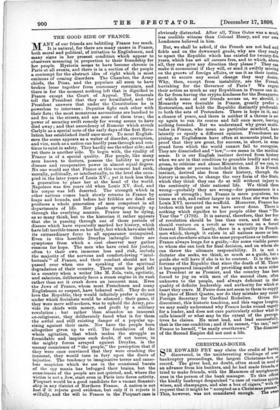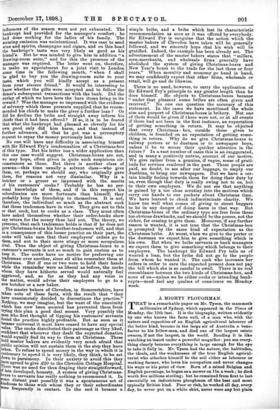CHRISTMAS-BOXES.
SIR EDWARD FRY may claim the credit of having discovered, in the uninteresting windings of some bankruptcy proceedings, the largest Christmas-box on record. The giver had, no doubt, often stood in need 01 an advance from his bankers, and he had made friends, or tried to make friends, with the Mammon of unrighteous- ness in the person of the bank manager. To this official the kindly bankrupt despatched "a case of various spirits, wines, and champagne, and also a box of cigars," with the request that it might be " accepted as a Christmas present. This, however, was not considered enough. The sweet influences of the season were not yet exhausted. The bankrupt had provided for the manager's comfort ; he had done nothing for the ladies of his family. The seeming omission was unintentional. It was easy to send wine and spirits, champagne and cigars, and on this head the bankrupt's taste was very likely as good as his friend's. But he was minded to give him in addition " a drawing-room suite," and for this the presence of the manager was required. The letter went on, therefore, to make an appointment for a joint visit to London acme time in the following month, " when I shall be glad to buy you the drawing-room suite to your taste, which you will kindly accept as a present from your sincere friend." It would be interesting to know whether the gifts were accepted and to follow the donor's subsequent transactions with the bank. Did the outlay of which we have here the bare items bring in its reward ? Was the manager so impressed with the evidence of solvency which these presents supplied that he recom- mended his chiefs to make the giver a further loan ? Or did he decline the bribe and straight away inform his chiefs that it had been offered ? If so, it is to be feared that what the bankrupt had planned so cleverly for his own good only did him harm, and that instead of further advances, all that he got was a peremptory request to repay the money previously lent him.
No one will have any difficulty in associating himself with Sir Edward Fry's condemnation of a Christmas-box of this type. But his letter has a wider application than this one case would suggest. Christmas-boxes are not, we may hope, often given in quite such suspicious cir- cumstances as these. But there is another class of persons—this time usually a solvent class—who give them, or, perhaps we should say, who originally gave them, for reasons not very dissimilar. Why is a butcher or a grocer so impressed with the merits of his customers' cooks ? Probably he has no per- sonal knowledge of them, and if in this respect his subordinates are more fortunate than himself, they probably keep the friendship to themselves. It is not, therefore, the individual so much as the abstract cook that these tradesmen have in view. They give not to this or that cook, but to cooks as a class. They must often have asked themselves whether their order-books show any return for the money thus laid out. The theory, we presume, that each tradesman holds is that if he does not give Christmas-boxes his brother-tradesmen will, and that as a consequence of this looser practice on their part, the cooks will take care that their employers' orders go to them, and not to their more stingy or more scrupulous rival. Thus the object of giving Christmas-boxes to a customer's servants is not so much to gain custom as to keep it. The cooks have no motive for preferring one tradesman over another, since all alike remember them at Christmas. But if one or two were to hold their hands while the remainder were as liberal as before, the cooks whom they have hitherto served would naturally feel aggrieved, and, so far as they had any voice in the matter, would advise their employers to go to a new butcher or a new baker.
The master bakers of Clevedon, in Somersetshire, have taken note of these facts, with the result that " they have unanimously decided to discontinue the practice." Nothing, we may imagine, but the want of the unanimity which has now been secured has prevented them from trying this plan a good deal sooner. Very possibly the man who first thought of tipping his customers' servants found the practice highly profitable. But as soon as it became universal it must have ceased to have any special value. The cooks distributed their patronage as they liked, confident that wherever they dealt the expected donation would equally find its way to them at Christmas. These bold master bakers are evidently very much afraid that public opinion will not sustain them in the step they have taken. To refuse to spend money in the way in which it is customary to spend it is very likely, they think, to be set down to parsimony. In their anxiety to avoid this they have agreed to give £20 to the Clevedon Cottage Hospital. bere was no need for thus draping their straightforward, If late developed, honesty. A system of giving Christmas- boxes to servants has really nothing to recommend it. In some distant past possibly it was a spontaneous act of mdness to those with whom they or their subordinates were frequently in contact. In the end it became a simple bribe, and a bribe which lost its characteristic recommendation as soon as it was offered by everybody. Sir Edward Fry is sanguine that the action which the master bakers of Cleveden have taken will be generally followed, and we sincerely hope that his wish will be gratified. Indeed, the example has been already set The advertisement of the master bakers states that " millers, corn-merchants, and wholesale firms generally have abolished the system of giving Christmas-boxes and New Year's boxes to the trade for the last three or four years." When morality and economy go hand in hand, we may confidently expect that other firms, wholesale or retail, will go and do likewise.
There is no need, however, to carry the application of Sir Edward Fry's principle to any greater length than he does himself. He objects to Christmas-boxes because " under that pleasant name bribes are often given and received." No one can question the accuracy of this statement. In the cases we have mentioned the whole aim and purport of Christmas-boxes is bribery. Not one of them would be given if there were not, or at all events if there had not been in the first instance, an expectation of getting something in return. It may be objected that every Christmas - box, outside those given to children, is founded on an expectation of getting some- thing in return. Why do we give Christmas-boxes to railway porters or to dustmen or to newspaper boys, unless it be to secure their quicker attention in the future ? In a vast number of cases this is an exaggerated, and in many a positively untrue, account of our motive. We give rather from a genuine, if vague, sense of grati- tude for services rendered in the past. These people are paid, no doubt, to see after our luggage, to empty our dustbins, to bring our newspapers. But we have a cer- tain kindly feeling towards them for doing their duty by us, even though that duty is really owing not to us, but to their own employers. We do not see that anything is gained by a too close scrutiny into the motives which carry our hands to our pockets about Christmas time. We have learned to check indiscriminate charity. We know too well what comes of giving to street beggars to be in any danger of doing harm in that way. But Christmas-boxes of the ordinary type are free from these too obvious drawbacks, and we should be the poorer, not the richer, for ceasing to give them. Moreover, if any further reason is wanted, it is not true that the Christmas-box is prompted by the same kind of expectation as the Christmas bribe. At worst, when we give to the porter or the dustman we expect him to give something which is his own. But when we bribe servants or bank managers we expect them to give something which belongs to their employers. The bankrupt Sir Edward Fry tells us of wanted a loan, but the bribe did not go to the people from whom he wanted it. The cook who increases her orders in order to earn the expected present does not pay the bill which she is so careful to swell. There is no rear resemblance between the two kinds of Christmas-box, and none of us—unless we be either cooks or intending bank- rupts—need feel any qualms of conscience on Monday week.











































 Previous page
Previous page